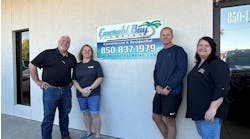BY BOB MIODONSKI
OF CONTRACTOR'S STAFF
ST. PETE BEACH, FLA. — An attentive audience at the Quality Service Contractors Power Meeting Feb. 25 here listened to money expert Jordan Goodman give his "12 Commandments of Personal Finance." Goodman, a former editor at Money magazine, speculated that QSC members spend more time worrying about their plumbing-and-heating service businesses than they do about their own financial situations.
He told QSC members that his suggestions fell into two categories: how to generate more money and where to invest it. He liberally sprinkled his talk with Website addresses and toll-free phone numbers where the contractors could get more information.
His 12 commandments are:
1. Never refuse free money if given to you. High on his list are dividend re-investment plans (directinvesting.com) and company 401(k) plans. For parents of college-age students, Goodman said that billions of dollars of merit-aid scholarship money that is not based on financial need is available every year (collegeanswers.net). He also mentioned a test that high school students could take to determine their most suitable college major.
"It's very expensive to change majors," Goodman said. "It adds one year and $35,000 to $40,000. Get your children to graduate in four years."
2. Buy things that appreciate and lease things that depreciate. "That seems obvious, but people often do the opposite," he said.
If you look at leasing as a way to free up capital, leasing makes sense. Leasing a car only makes sense if you don't drive a lot of miles, he said.
"If you have two cars, drive the one that you own into the ground and lease the other one," Goodman said.
Independent car search firms (CarQ.com) can find the best deals possible deals on cars and light trucks, he said. The service charge is no more than $350.
Buying real estate makes sense only if the property appreciates in value.
"If you're in an area where real estate is falling, there's nothing wrong with renting," Goodman said.
3. Become a credit card surfer. Transferring balances from high-interest to low-interest credit cards is the new national pastime, he said, with some people hopping from teaser rate to teaser rate. He cautioned that banks are making it easy for credit card users to pay late by making the payment date on weekends (if it arrives Monday, it means a late fee); by moving the mailing address farther away geographically; and by setting a specific hour when a payment has to arrive to be considered on time.
His solution is to pay a credit card bill electronically and one day in advance of the due date. He also recommended that surfers close old credit card accounts as they open new ones.
Goodman said that everyone should check his credit report at least once a week to protect against identity theft and unwarranted credit card charges. Knowing what's in your credit history has other benefits too.
"Car insurance rates in some states are tied more to your credit report than your driving record," he said.
4. Use time when it is on your side. Young people should be more aggressive in how they invest their money than older people.
5. Set up automatic savings plans. People who have a regular amount of money going into a stock or mutual fund will buy more shares when prices are low and fewer shares when prices are high, Goodman said. Annuities, IRAs and U.S. Savings Bonds (savingsbonds.gov) offer automatic savings plans as well.
6. Know where you spend your money. "You take money out of an ATM, and you don't know where it goes," he said. "Get control of your mystery cash, and you'll do a lot better."
7. Don't count on a "white knight" to save you. Even when people strike it rich in the lottery, history has shown that it doesn't change their financial situation, Goodman said. They spend the money on fancy cars and other extravagances. Too many people suffer from White Knight Syndrome, thinking that the Lotto, Aunt Milly's will or gambling will be their financial salvation, he said.
8. Earn the highest possible yields on your cash. People should switch from passbook and checking accounts to top-yielding money market mutual funds and short-term bond mutual funds, he said. His other recommendations included highly rated preferred stocks, real estate investment trusts, and oil and gas royalty trusts.
9. Buy insurance mainly to replace lost income, not as an investment. Everyone needs insurance for their life, health, car, home, long-term care and disability, he said.
"Insurance is one thing you buy that you hope you will never use," Goodman said. "Protect yourself against disaster. Get the biggest deductible you can stomach to keep your premiums low."
For life insurance, he recommended at least $1 million in coverage or seven times a person's annual income. For health insurance, he said that QSC members should investigate medical repricing, for which they would pay a relatively small fee and gain access to a big network of hospitals (medicalrepricing.com, 800/915-5677), and which they can combine with a high deductible for major coverage. He also mentioned health savings accounts (hsabank.com) as an option.
Long-term care insurance (searchLTC.com, 800/587-3279) is getting more attention as the nation's population is getting older.
"Get it now when you're younger and healthier," he advised.
10. Don't automatically make extra principal payments on your mortgage. People should figure out whether their house is likely to appreciate faster than alternative investments such as stocks and mutual funds and put their money in the asset that will grow the most.
"Don't be house rich and cash poor," he said.
11. Remember that you live in the "sandwich generation." Many people today find they have their parents above them, their children below them, and they're in the middle.
"Plan to finance your own retirement, help your parents and fund your children's education," Goodman said.
12. Use the "investment pyramid of risk." Goodman designed this model with the top representing aggressive growth, the middle equity income and the bottom stable value. High-risk investments at the top include junk bonds and technology stocks, medium-risk are corporate bonds and life insurance, and low risk are money market funds and bank CDs.
Goodman recommended that people put more money at the top of the pyramid when their investment goal is further in the future and more money at the bottom when they know they will need it for college tuition or a down payment on a house.
"People have too much money at the bottom of the pyramid because they're more afraid of losing money than they're concerned about making money," he said.
Goodman finished his presentation with an extended pitch to QSC members to pay $997 that day to join an investment club to which he belonged. While his 12 commandments were well received by QSC members, Good-man's closing comments turned off some contractors, one of whom said he felt as though he was in an audience for an infomercial.
QSC is a subgroup of the Plumbing-Heating-Cooling Contractors — National Association.

